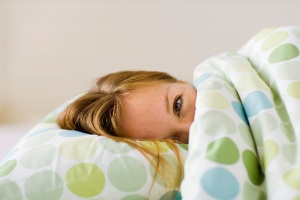 Did you know that women are twice as likely to have difficulties falling and staying asleep than men? There are many reasons that drive this to happen, including female hormones, menstrual cycles, and stress-related activities. Typically, younger women are more likely to have a good night’s rest, but in some cases, women who are in their reproductive years may still find this to be a problem. Additionally, women may reduce the number of hours they sleep because of their lifestyles as mothers and wives. With thirty percent of employed women reporting problems sleeping, this is not a topic that should be taken lightly. Below we will provide the most common reasons for sleep disorders that women face.
Did you know that women are twice as likely to have difficulties falling and staying asleep than men? There are many reasons that drive this to happen, including female hormones, menstrual cycles, and stress-related activities. Typically, younger women are more likely to have a good night’s rest, but in some cases, women who are in their reproductive years may still find this to be a problem. Additionally, women may reduce the number of hours they sleep because of their lifestyles as mothers and wives. With thirty percent of employed women reporting problems sleeping, this is not a topic that should be taken lightly. Below we will provide the most common reasons for sleep disorders that women face.
1. Stress
Women have many causes for stress in their lives, which can range from ideologies of social status to the stress of fulfilling their role as a mother and a wife. In order to cope with the stress associated with daily tasks such as work and mothering, women tend to overlook the importance of sleep. Cutting down hours to perform their responsibilities is typical, but it leads to greater issues such as fatigue and insomnia.
2. Menstrual Cycles
Premenstrual changes in women affect the way that they sleep. The most common disorders associated with premenstrual syndrome (PMS) all include trouble falling asleep, difficulty waking up, nighttime waking, fatigue during the day, and insomnia, which is the most common of them all. All of these sleep issues take place because of the change in hormone levels during women’s menstrual cycle. The hormonal effects can directly affect sleep, or be indirect and affect mood and their emotional states.
3. Pregnancy
Women face different sleeping patterns during each trimester of their pregnancy. During the first trimester, women usually sleep for longer periods of time and take naps. This is because women tend to feel sleepier and require greater amounts of sleep within this period. Sleep improves during the second trimester, but in the third, sleep becomes disrupted due to many conditions. Some potential sleep threats include heartburn, frequent urination, movement of the fetus, aches, pains, and overall discomfort. The most common sleep disorders associated with pregnancy include snoring and sleep apnea, due to nasal passages becoming swollen.
4. Menopause
Women also have to undergo the physical and hormonal changes associated with menopause. During menopause, estrogen levels fall, which helps to create a variety of disturbances in women’s sleep. Hot flashes and night sweats are linked to low estrogen levels, which can be the cause of waking up during the night or feeling fatigued during the day.
These are all gender-specific reasons as to why women deal with many different sleep disorders, but they are not the only causes. Other reasons may include caffeine, nicotine, depression, obesity, and inactivity. Women are more likely to deal with sleep disorders at an older age. If you find that you suffer from certain sleep disorders and would like to get the best sleep possible, please visit our website to see what our sleep products can do for you!
